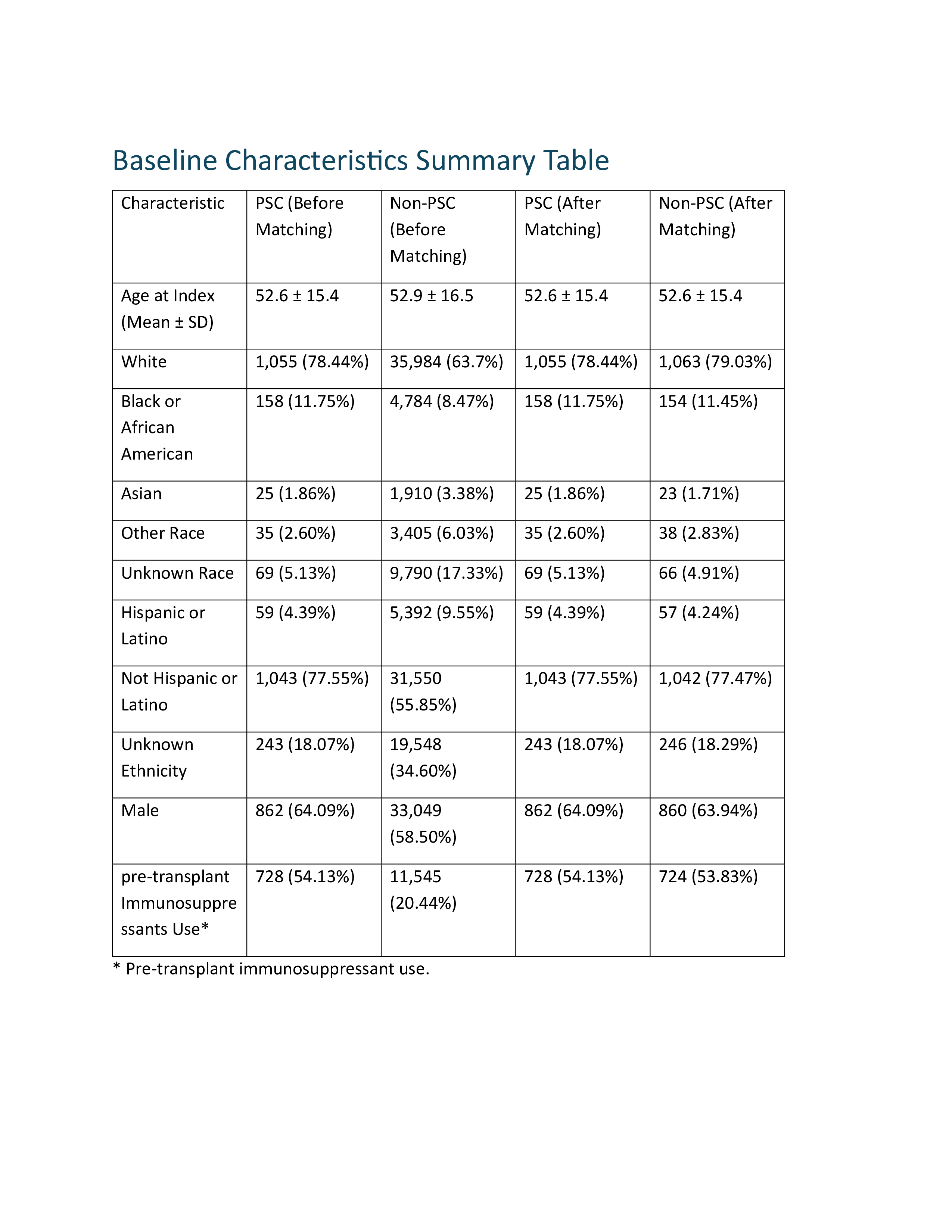Tuesday Poster Session
Category: Liver
P5893 - Increased Risk of Liver Transplant Rejection or Failure in Patients With Primary Sclerosing Cholangitis: A Propensity-Matched Retrospective Cohort Study Using a Global Federated Health Network
Tuesday, October 28, 2025
10:30 AM - 4:00 PM PDT
Location: Exhibit Hall

Ali Osman, MD, MSCI Candidate
Washington University School of Medicine in St. Louis
Ballwin, MO
Presenting Author(s)
Ali Osman, MD, MSCI Candidate1, Mohamed Abdallah, MD2, Abdellatif Ismail, MD3, Khalid Ahmed, MD4, Nizar Mukhtar, MD5
1Washington University School of Medicine in St. Louis, Ballwin, MO; 2Corewell Health, Royal Oak, MI; 3University of Maryland, Baltimore, MD; 4University of Minnesota, Minneapolis, MN; 5Kaiser Permanente Northern California, San Francisco, CA
Introduction: Primary sclerosing cholangitis (PSC) is a progressive cholestatic liver disease that often necessitates liver transplantation. However, the impact of underlying PSC on post-transplant outcomes remains under-investigated. We aimed to compare the risk of liver transplant rejection or failure in recipients with and without PSC.
Methods: We utilized the TriNetX Global Collaborative Network, which aggregates data from 145 healthcare organizations. Adults (≥18 years) who underwent liver transplantation were divided into two cohorts: (1) patients with a diagnosis of PSC prior to transplantation (n = 1,345) and (2) non-PSC liver transplant recipients (n = 1,345), matched 1:1 using propensity scores based on demographics and pre-transplant immunosuppressive medication use. The primary composite outcome was liver transplant rejection or failure, defined by ICD-10 codes T86.41 and T86.42. Risk analysis and Kaplan-Meier survival analysis were performed, excluding patients with pre-existing outcomes.
Results: After exclusion, 1,102 patients with PSC and 1,294 without PSC were included in the outcome analysis. The incidence of transplant rejection or failure was significantly higher in the PSC cohort compared to the non-PSC group (17.3% vs. 9.7%; risk ratio 1.78, 95% CI: 1.44–2.20; p < 0.001). Kaplan-Meier analysis showed a lower survival probability in the PSC group at the end of follow-up (62.4% vs. 82.6%, log-rank p < 0.001). The hazard ratio for rejection or failure in the PSC group was 1.77 (95% CI: 1.41–2.22). The median follow-up was 41.4 months for PSC patients and 36.1 months for non-PSC patients.
Discussion: Patients with PSC undergoing liver transplantation are at significantly higher risk of graft rejection or failure compared to those without PSC. These findings underscore the need for enhanced post-transplant surveillance and individualized immunosuppressive strategies in this high-risk population.

Figure: Table-1: Baseline Characteristics Summary Table Before and After Matching

Figure: Fig-1: Risk Comparison: PSC vs Non-PSC Liver Transplant Recipients.
Disclosures:
Ali Osman indicated no relevant financial relationships.
Mohamed Abdallah indicated no relevant financial relationships.
Abdellatif Ismail indicated no relevant financial relationships.
Khalid Ahmed indicated no relevant financial relationships.
Nizar Mukhtar indicated no relevant financial relationships.
Ali Osman, MD, MSCI Candidate1, Mohamed Abdallah, MD2, Abdellatif Ismail, MD3, Khalid Ahmed, MD4, Nizar Mukhtar, MD5. P5893 - Increased Risk of Liver Transplant Rejection or Failure in Patients With Primary Sclerosing Cholangitis: A Propensity-Matched Retrospective Cohort Study Using a Global Federated Health Network, ACG 2025 Annual Scientific Meeting Abstracts. Phoenix, AZ: American College of Gastroenterology.
1Washington University School of Medicine in St. Louis, Ballwin, MO; 2Corewell Health, Royal Oak, MI; 3University of Maryland, Baltimore, MD; 4University of Minnesota, Minneapolis, MN; 5Kaiser Permanente Northern California, San Francisco, CA
Introduction: Primary sclerosing cholangitis (PSC) is a progressive cholestatic liver disease that often necessitates liver transplantation. However, the impact of underlying PSC on post-transplant outcomes remains under-investigated. We aimed to compare the risk of liver transplant rejection or failure in recipients with and without PSC.
Methods: We utilized the TriNetX Global Collaborative Network, which aggregates data from 145 healthcare organizations. Adults (≥18 years) who underwent liver transplantation were divided into two cohorts: (1) patients with a diagnosis of PSC prior to transplantation (n = 1,345) and (2) non-PSC liver transplant recipients (n = 1,345), matched 1:1 using propensity scores based on demographics and pre-transplant immunosuppressive medication use. The primary composite outcome was liver transplant rejection or failure, defined by ICD-10 codes T86.41 and T86.42. Risk analysis and Kaplan-Meier survival analysis were performed, excluding patients with pre-existing outcomes.
Results: After exclusion, 1,102 patients with PSC and 1,294 without PSC were included in the outcome analysis. The incidence of transplant rejection or failure was significantly higher in the PSC cohort compared to the non-PSC group (17.3% vs. 9.7%; risk ratio 1.78, 95% CI: 1.44–2.20; p < 0.001). Kaplan-Meier analysis showed a lower survival probability in the PSC group at the end of follow-up (62.4% vs. 82.6%, log-rank p < 0.001). The hazard ratio for rejection or failure in the PSC group was 1.77 (95% CI: 1.41–2.22). The median follow-up was 41.4 months for PSC patients and 36.1 months for non-PSC patients.
Discussion: Patients with PSC undergoing liver transplantation are at significantly higher risk of graft rejection or failure compared to those without PSC. These findings underscore the need for enhanced post-transplant surveillance and individualized immunosuppressive strategies in this high-risk population.

Figure: Table-1: Baseline Characteristics Summary Table Before and After Matching

Figure: Fig-1: Risk Comparison: PSC vs Non-PSC Liver Transplant Recipients.
Disclosures:
Ali Osman indicated no relevant financial relationships.
Mohamed Abdallah indicated no relevant financial relationships.
Abdellatif Ismail indicated no relevant financial relationships.
Khalid Ahmed indicated no relevant financial relationships.
Nizar Mukhtar indicated no relevant financial relationships.
Ali Osman, MD, MSCI Candidate1, Mohamed Abdallah, MD2, Abdellatif Ismail, MD3, Khalid Ahmed, MD4, Nizar Mukhtar, MD5. P5893 - Increased Risk of Liver Transplant Rejection or Failure in Patients With Primary Sclerosing Cholangitis: A Propensity-Matched Retrospective Cohort Study Using a Global Federated Health Network, ACG 2025 Annual Scientific Meeting Abstracts. Phoenix, AZ: American College of Gastroenterology.
